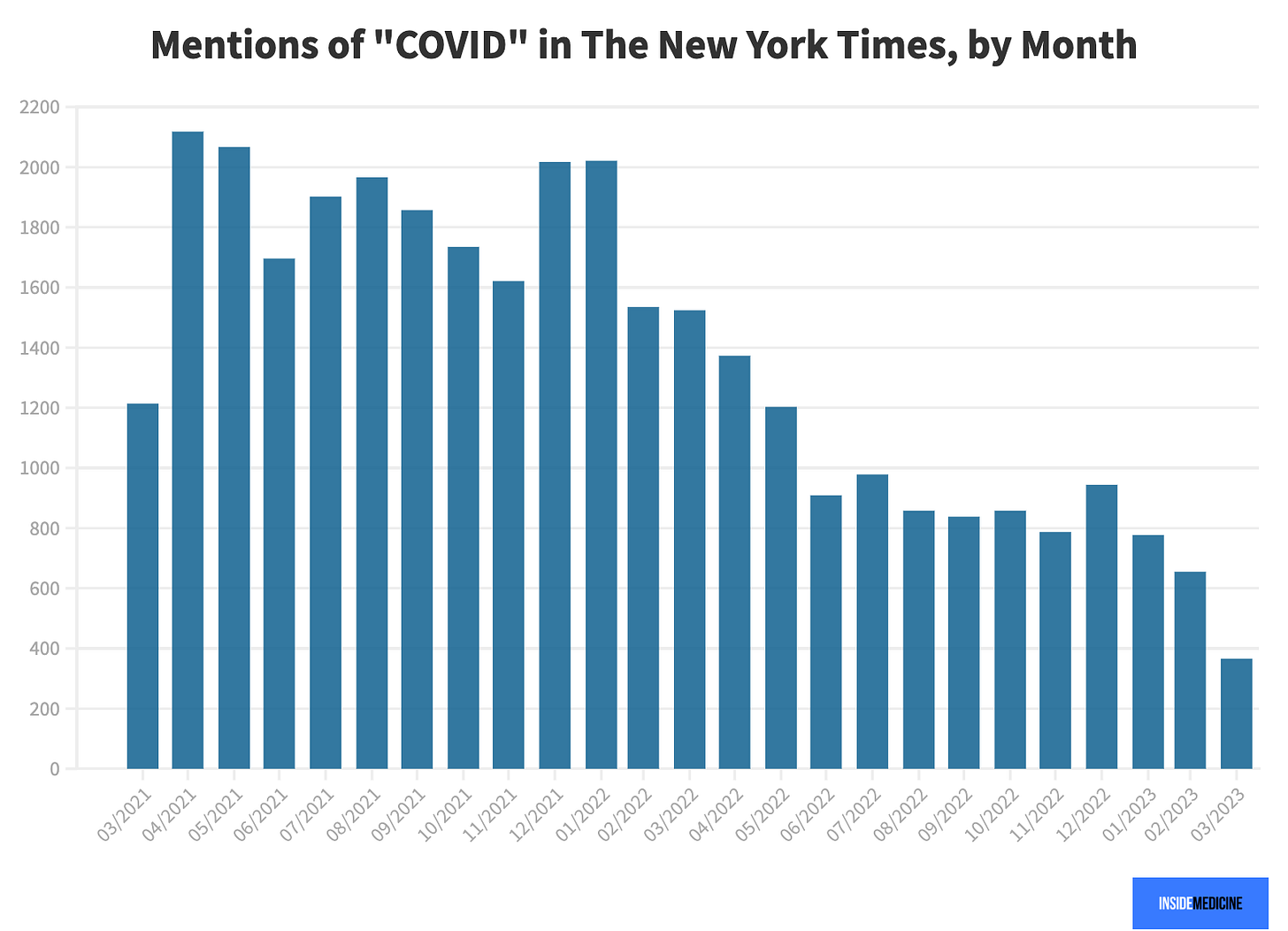This week, I emailed a handful of excellent journalists who have covered my Covid-19 research in the past. I was hoping they’d cover some new work my collaborators and I had just published. Two of the journalists said they’d finally returned to their previous beats (climate change in both cases, as it happens). Two others did not reply. One journalist expressed interest. Now, I’m totally spoiled, but this is a pretty low hit rate for work of this caliber and implications.
Still, I’m not taking it personally. Clearly, Covid-19 has faded from the news.
That’s reasonable as far as it goes. We are not in the midst of a massive wave, but we are still seeing hundreds of deaths every day. How much media attention Covid should get on a daily basis is not something I claim to know. Regardless, the public’s interest has waned.
In this week’s Data Snapshot, we look at Google searches and Covid-19 cases since 2020. The correlation is impressive. (In the fall of 2020, researchers noticed the same thing in Google searches. Cases and searches aligned.) Current interest in the topic is low among the general public.
Back when I was editing and publishing Brief19 (the precursor to this newsletter), my friend and collaborator Kane Elfman noticed the same unsettling trend in our reader metrics. Case counts tracked with Brief19 readership. When Covid-19 surged, so did page views. It made sense. But it was sad to realize that more readers on a particular week was not something to celebrate.
Inside Medicine also looked at Covid mentions in the New York Times (since March of 2021).
A problem these datasets do not show is that Covid is also becoming more difficult for the media to cover. Research coming out in 2023 is a lot more complicated than that of 2020 and 2021—the topics more nuanced, the veracity and meanings of the results hinging on minutia found within the technical details of the studies. So not only are there fewer journalists covering Covid, but to do the work correctly, it takes them more time to really “get” what is happening.
Do you sense that Covid’s coverage in the media has changed? What is your perception of the quality and quantity of Covid news coverage these days? Please chime in below.
Thanks to Benjy Renton for curating Data Snapshot.
Data sources:
https://trends.google.com/home
https://covid.cdc.gov/covid-data-tracker/#trends_weeklycases_select_00
https://www.dowjones.com/professional/factiva/






This conclusion is spot on accurate. We have friends who had been careful, used masks in all public settings, maintained their vaccines and avoided gatherings and have recently been infected. Like us, these friends are older, and we worry about them and us because the hospitalizations and daily death numbers should be unacceptable, but public awareness or possibly empathy is gone. A few folks who remain cautious are aware of the problem, but like all human suffering, if the war is not in your neighborhood and friends and family are not being drafted and sent to the front lines, it becomes easier to ignore and pretend the war is not happening. I continually forget that we are really just animals who can speak but many of us cannot reason or are just selfish brutes. This is a grim morning for me. Sorry.
COVID is not being covered in the news media-- the data is fading away and the prevailing narrative is that it’s over. The few articles that addressed that it is still a health risk for older people -- and none published recently--got many comments. When I read the papers now-- Boston Globe, NYT, WaPo-- I feel like I’m in a separate reality. I still care and try to avoid infection, but the main stream news is “post pandemic “ and considers endemic harmless. I read a Bill Hanage article in the Harvard Gazette that made me feel less crazy. He mentioned that 150,000 people die every year in the US still. I abhor Twitter, but that’s the only place where COVID exists--and even on crazy Twitter it's fading away. I follow Michael Osterholm and Eric Topol and know that my concerns aren't shared by the public or public health.
https://news.harvard.edu/gazette/story/2023/03/william-hanage-on-covid-lessons-we-still-need-to-learn/